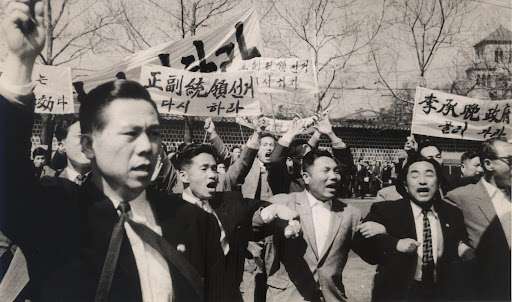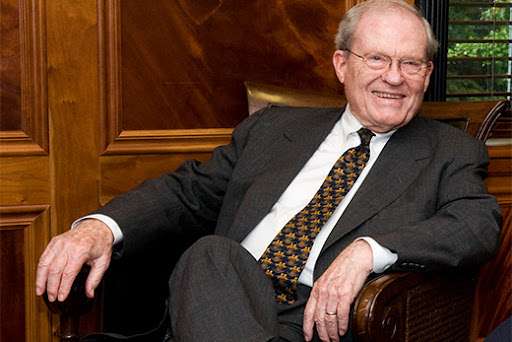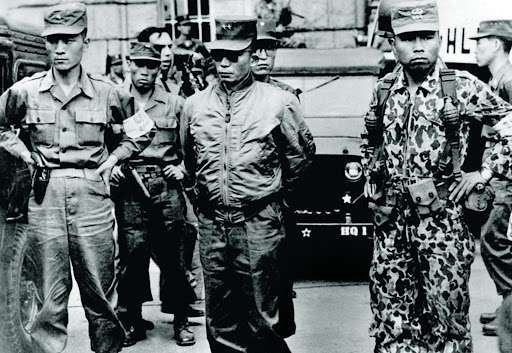Korean Christianity appears to observers as embedded in Korean history and tradition. However, this is not the case, as Korean Christianity is still a minority religion and only entered mainstream South Korean society during the mid-twentieth century, when many American Christian missionaries began evangelizing in South Korea. One of them was a young Methodist Missionary named James T. Laney, who previously served in Korea as a Counterintelligence Officer between 1947–1948. Laney’s fascination with Korean culture and society convinced him to return to South Korea in 1959.
Laney arrived at one of the most politically turbulent eras in South Korean history. In 1960, South Korean students overthrew South Korean dictator Syngman Rhee in the democratic April Revolution. In 1961, South Korean General Park Chung Hee launched a coup d’état against the government and established a military dictatorship. Laney witnessed firsthand the political infighting between the democrats and the militarists that would define more than two decades of Korean history. Through his role as a missionary, Laney was able to connect with the Korean people on a personal level that made him better understand them in ways many Americans couldn’t during the mid-twentieth century.
In this Moment, we see that Laney’s recollections show that cultural and religious diplomacy played significant roles in developing U.S.-South Korean ties as well. Laney would later go on to become President of Emory University as well as the United States Ambassador to South Korea (1993–1996), playing a key role during the 1994 North Korean Nuclear Crisis. James T. Laney’s interview was conducted by David Reuther on March 26, 2004.
Read James T. Laney’s full oral history HERE.
Read another account of James T. Laney’s Foreign Service career HERE.
For more Moments on US-South Korean relations click HERE.
Drafted by Sun Woo Park
ADST relies on the generous support of our members and readers like you. Please support our efforts to continue capturing, preserving, and sharing the experiences of America’s diplomats.
Excerpts:
“The students of that era in Korea were very idealistic…It was the students doing the marching, the attempt to control it and keep it from getting out of hand grew more and more frantic, and that then led to the shooting of these students right on the main plaza of Seoul, just exactly like Tiananmen Square, but 29 years earlier.””

Witnessing the Start of a Revolution
This was the early days of democracy, and there was also a great deal of criticism of Syngman Rhee’s corruption and oppression at that time. It was the students, as you might recall, who in 1960 demonstrated, and over a hundred of them were killed on the streets of Seoul by Syngman Rhee’s army, and that brought down Syngman Rhee. He was dispatched to Honolulu by the American ambassador, Walter McConaughy [served as Ambassador to Korea from December 1959 to April 1961]. McConaughy had to go to his house and say, “You’re through. We have a plane ready to take you to Hawaii.”
Q: Now you were there watching these events?
LANEY: I was there. Yes.
Q: It must have been a very heady time to talk to the students on one hand and see these things unfold.
LANEY: Well, it was a dicey time because we didn’t know how things were going to turn out when they were unfolding. It was bloody, it was an attempt at total suppression, and it was only the most egregious example of brutality on the part of the government, which was so public that the whole world was outraged. I mean it was the Tiananmen Square of Seoul in 1960. “Sa-il-gu” it’s called, 19 April 1960.”
“We felt we were making history!”
Christianity as a Citadel of Korean Identity
LANEY: The growth of the church in Korea has been noted by many people because it’s so far in excess of anything else in Asia: that one-half of one percent in Japan [is Christian], which speaks of their insularity; China’s [Christian population] is a little bit larger percentage, of course, a huge number of people because any percentage in China brings you a lot of people! But Korea’s really remarkable, and I think part of it was that in the 1920s and 1930s the American missionaries in Korea and the church in Korea was one of the few remaining citadels of Korean identity that the Japanese did not tamper with initially. It was where they could still speak their own language, because the schools forced them to speak Japanese, outside the home. And so, as a result, instead of seeing the church as foreign, the church became Korean, and what was foreign was Japanese. But this sort of strange historical twist took away the foreign nature of the church for the Koreans because they had appropriated it as theirs, and this is almost a historical act. It had nothing to do with the missionaries, except they just abetted it, you know, as best they could. As a result, the church did not have to overcome the sense of strangeness because they had crossed that barrier back during the Japanese occupation. It’s a very interesting thing!
Q: Now on campus, your duties were too…?
LANEY: I had two, really three duties: I was associate chaplain; I was teaching in the graduate school of theology, which, by the way, was intended to be an international program, not just for Korea. The intent was to bring other Asian Christians into Yonsei’s program; and then the third thing I was doing, I was working with some other Korean leaders of my age, my cohort, in establishing what we call a student Christian movement nationally. For this we designed study materials, we talked about nation building, we talked about ethics, we talked about institutions, what’s required in building institutions, and all. This was a larger canvas on which I worked in terms of working with students, and I went around the country talking about these things. This was quite a marvelous opportunity.
LANEY: All of my cohorts with the student movement were Korean, and these were very bright, able people who later took positions in government. I felt so privileged to be a part of this group. We were otherwise all foreign nationals, but I was taken into their confidence and had credibility. We felt like we were preparing a younger generation for leadership in a democracy. That’s what we really were working at, and we were very serious about it, and we had a lot of fun, and we had enormous sense of purpose and moral leadership.”
“I mean if you criticized the government it was because you were a Communist, not because the government was really vulnerable to criticism. So there was that sense of pressure—I don’t want to quite call it oppression, but pressure—on the students.”
Korean Militarism on the Rise
Q: Living in the community I suspect you might have had the same reactions as your Korean colleagues as political events in Korea unfold—the removal of Syngman Rhee, and then the arrival of the military governments. Well, as you saw those events unfold, did they really impact what you were doing? I mean you see—
LANEY: Well, yes; the course it did, particularly…well, all of it did because both the tragedy and then the headiness of what we call the student revolution, and then the
oppression, the growing oppression of the Park Chung Hee regime, in terms of the KCIA (Korean Central Intelligence Agency) infiltrating the colleges and monitoring the people who were criticizing the government….Of course they [the KCIA] always called such critics as Communists. [Laughter].
LANEY: But…you know, I was rather callow at that age and felt like it was my calling to beard the tyrant, you know. I was very outspoken, and I’m sure that I became a vicarious
mouthpiece for a lot of people who wouldn’t say the same thing because I could do it with impunity. I was aware of that! I didn’t have any illusions, and it was because, in some sense, it was an arrogant American approach. I could say these things critically of the government because they couldn’t do anything about it, or you know, later on they did; they deported missionaries later who were critical. But at that point, they were uneasy to be that hard-nosed, and you know, I wasn’t gratuitously public about it.
TABLE OF CONTENTS HIGHLIGHT
Education
BA in Economics, Yale University 1945–1950
BA in Divinity, Yale University, 1950–1954
PhD in Christian Ethics, Yale University 1964–1966
U.S. Army, U.S. Counter Intelligence Corps 1947–1948
Methodist Missionary, Associate Chaplain 1959–1964
Higher Education 1966–1993
Vanderbilt University—Assistant Professor 1966–1969
Emory University—Dean at Chandler School of Theology 1969–1977
Emory University—President 1978–1996
Joined the Foreign Service 1993–1996
Seoul, South Korea—Ambassador 1993–1996


